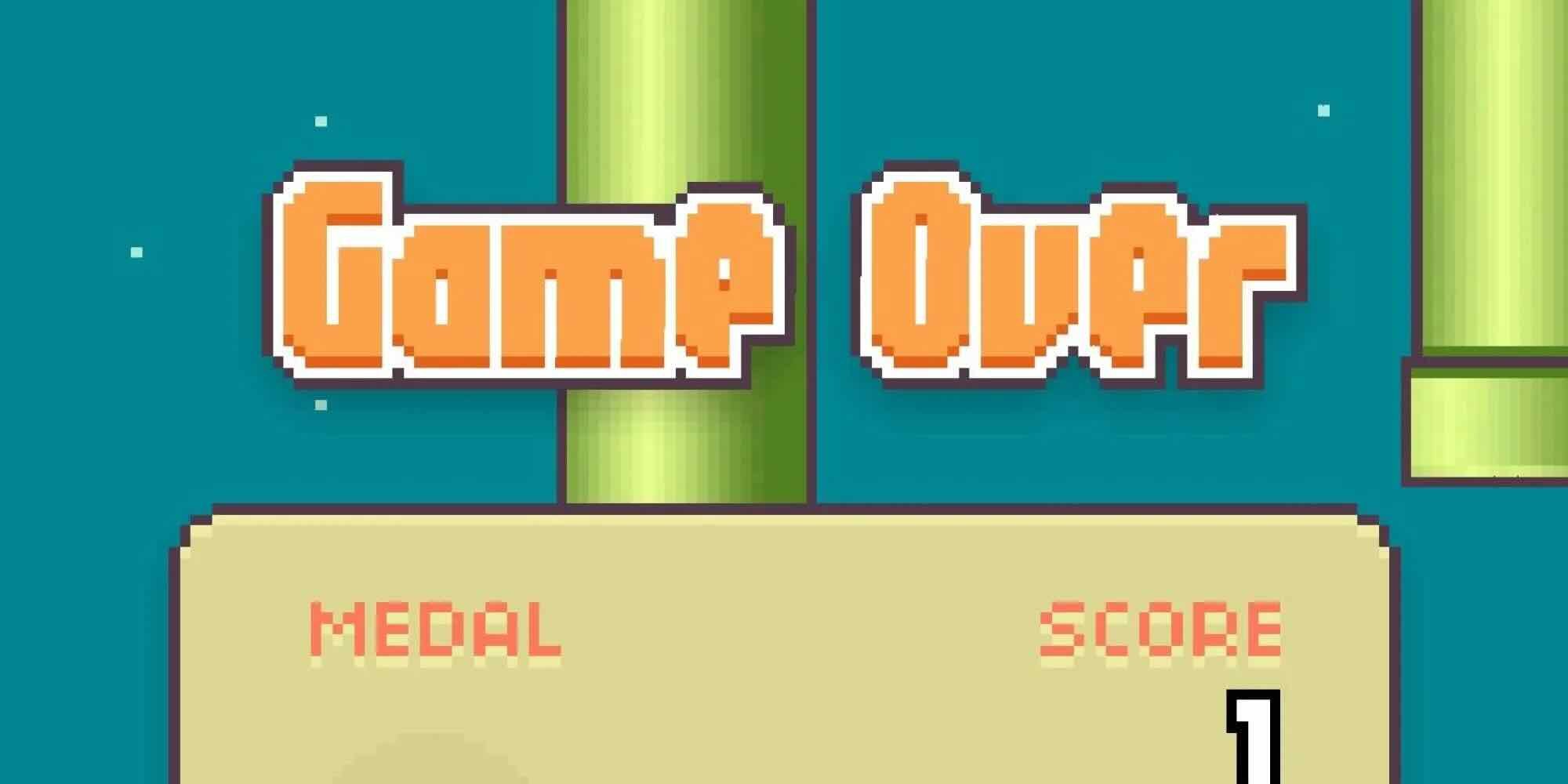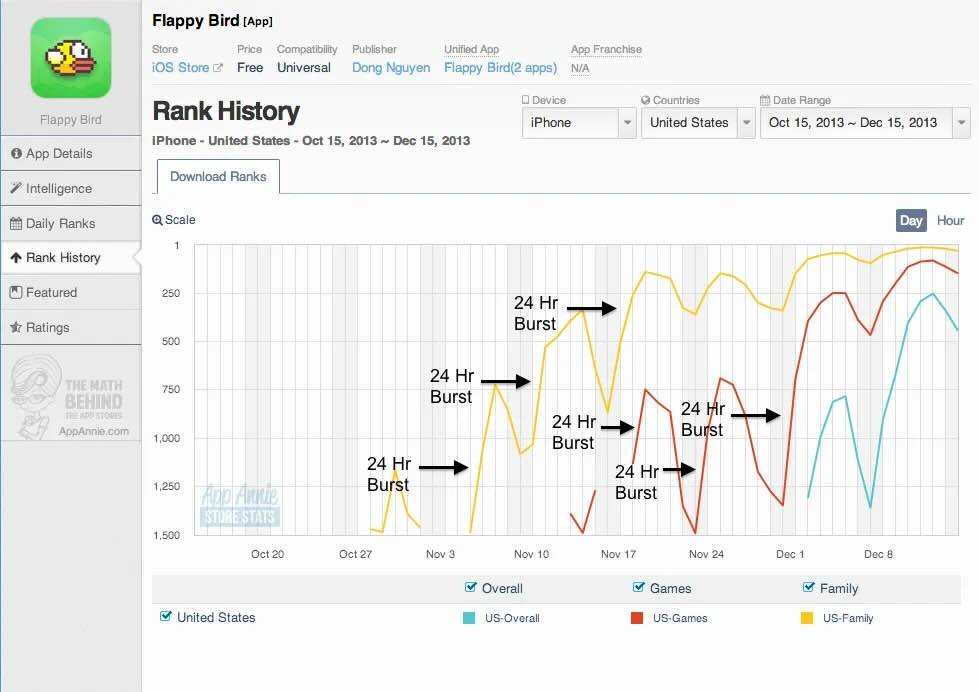The Real Story Behind Why Flappy Bird Was Deleted
The rise and fall of the biggest game in 2014
By now most of you are familiar with Flappy Bird — the super difficult endless tapper that has taken the world by storm. For the past 24 days, Flappy Bird has been the number one free app on Apple’s App Store®. The creator Dong Nguyen is reported to be making $50,000 per day in ad revenue. For a terrific review on why Flappy Bird’s design is genius go here. The game is not without controversy however as just this weekend the creator of Flappy Bird announced that he is pulling his app off both app stores. Why would an indie developer in Vietnam voluntarily walk away from millions of dollars? To get a better understanding we have to go back to the beginning.
The Flappy Bird Game
The Flappy Bird game is a simple yet addictive mobile game that first fluttered onto the scene in 2013. Created by Dong Nguyen, a solo Vietnamese developer, the game was initially released on the Apple App Store. The objective is straightforward: control a bird that must navigate through gaps between green pipes without crashing into them. This simplicity, combined with its accessibility, made the game appealing to a wide range of players. The minimalist design and easy-to-understand mechanics quickly turned Flappy Bird into a viral sensation, capturing the hearts of millions.
One of the key reasons behind the massive popularity of the Flappy Bird game was its addictive nature. The game’s simplicity and lack of complex player controls made it easy for anyone to pick up and play. However, its challenging gameplay kept players coming back for more. The infinite runner style, where the goal is to see how far you can go without hitting the pipes, created a compelling loop that was hard to resist. The game’s ability to elicit strong, primal, and emotional reactions from players—ranging from frustration to triumph—fueled its addictive nature and kept people tapping away on their mobile devices.
A Nose Dive into the Abyss
If you’d thought Flappy Bird was just released this past January, you’d be wrong. Nguygen actually launched Flappy Bird on Apple’s App Store on May 24th 2013. According to App Annie, when Flappy Bird launched it ranked 892 in the family game category. Three days later it had fallen off the charts and into the abyss, where it stayed for the next five months. Completely unloved, unknown. Flappy Bird was for all intents and purposes a failure.
Flappy Bird Takes Flight: The Story of Dong Nguyen
On October 29th, 2013 Flappy Bird clawed its way back into the charts. In the months following, it went on a turbulent roller coaster ride zig-zagging up and down the charts until finally settling in at number one on January 17. In an interview with The Chocolate Lab Apps Nguyen was asked if the game’s success was due to only organic installs to which he responded:
“I didn’t use any promotion methods. All accounts on Twitter, Facebook and Instagram about Flappy Bird are not mine. The popularity could be my luck.”
Are we to believe that Nguyen didn’t spend a dime on user acquisition and just got lucky? A quick look at the rank history on App Annie paints an entirely different picture.
Chart courtesy of App Annie
The game appears to have received several massive download bursts within a 24 hour period. Each burst of new users would push Flappy Bird higher up the charts. The effect would wear off after just a few days, leading to a sharp drop in ranking. But before Flappy Bird would drop too low, another burst would kick in. This went on for each week for six straight weeks until Flappy Bird had enough organic users to carry it to the top. Having worked in the mobile ad industry for the last several years I can tell you that Flappy Bird’s chart does indicate that advertising was in fact used. In total, I estimate that Flappy Bird received approximately 75,000 downloads from his burst campaigns.
The real question though is how did an indie developer in Vietnam afford 75,000 downloads? If he were to pay for them through legitimate advertising channels it would have cost Nguyen about $100,000.
The Underbelly of App Discovery in App Stores
When Apple tweaked its App Store algorithm back in June 2012, there was a sharp rise in shady marketing practices. Underground companies would game the app ranking system for developers using overseas bots. The most successful services were difficult for Apple to block. Rather than fake downloads and reviews with malicious software programs, these services would pay hundreds of thousands of real users a tiny amount of money to download the specified app within 24 hours. While legally and ethically questionable, they were actual iTunes accounts being used and that gave those downloads credibility in Apple’s ranking algorithm.
App discovery isn’t broken, it’s just reserved for the rich and people willing to break the rules.
It can cost as much as $100,000 for a legitimate advertising campaign designed to reach and hold a top 25 spot on the app store for several weeks. There are only a few hundred mobile companies in the world with advertising budgets that large. Most indie developers launch their title with little ($5,000 or less) to zero ad spend. Outside of getting featured by Apple or Google, the future is bleak for most apps. AppPromo’s 2013 developer attitudes survey concluded that more than 2/3 of app developers fail to break even. Gartner has predicted that by 2018 only 0.01% of apps will be financially viable.
Bot farms on the other hand offer app developers a shot at success by guaranteeing a top 25 rank at one tenth the cost. In July ‘13 Apple banned one the largest game developers (Animoca) from its App Store for engaging in such practices. It sent a strong message to the developer community — bot farms will get you banned. Companies like Zynga, King, and SuperCell make way too much money to put themselves at risk of getting banned over shady marketing practices.
However, for the frustrated indie developer on a budget, the dilemma becomes watch your app fall off the charts and do nothing or break the rules albeit at the risk of Apple’s fury. Either way — if indie developers do nothing their app is sure to fail, if they use bot farms it might still fail, but at least they have a shot. If the app is overwhelmingly loved like in Flappy Bird’s case, it will remain in the top ranks making the developer money long after the promotion is over.
Flying Too Close To The Sun
Over the weekend the creator of Flappy Bird announced that he was pulling the number one iOS and Google Play Store app off both app stores. The only explanation given via Twitter:
“I can call ‘Flappy Bird’ is a success of mine. But it also ruins my simple life. So now I hate it. It is not anything related to legal issues. I just cannot keep it anymore. I also don’t sell ‘Flappy Bird’, please don’t ask.”
So after raking in over a million dollars it’s time to just walk away from the hottest game of 2014? Oddly enough, Dong’s other games are still live in both app stores. His last tweet claims that he will continue making games.
Despite its removal, Flappy Bird can still be played for free in web browsers on both desktop and mobile device platforms.
In what surely is one of the strangest stories in years we are unlikely to ever really know what officially happened. Was Apple onto Dong’s rumored use of bot farms and requested he take it down? Was he scared off by a copyright lawsuit from Nintendo? Was this all a brilliant marketing stunt designed to squeeze the last ounce of virality from Flappy Bird before it fizzled out? Or has he really been telling the truth and completely burnt out?
Most of us can’t understand why an app developer would walk away from $50,000 a day. While I’ve never made a smash hit, I can imagine it’s pretty overwhelming to someone not used to the limelight. People coming out of the woodwork asking for handouts. Journalists from every news organization contacting you for interviews. Hundreds of ad networks spamming you with promises of riches if you just use their solution. Thousands of fans contacting you on twitter everyday expecting you to engage. Give the people what they want — more colors, more options, more platforms supported. It sounds exhausting.
And for this reason possibly, Dong Nguyen quietly pulled Flappy Bird from the app stores yesterday in order to return to a simpler life. While the romantic in me wants to believe Nguyen’s story, the most likely reason why Flappy Bird was deleted is that he broke the rules, Apple found out, withheld his earnings, and forced him to take the game down.
Hatching App Discovery 2.0
Did Nguyen use bot farms to reach the top? Probably. Should Apple have pulled Flappy Bird if he did? I don’t know. On the one hand I can see how unfair it is to all the developers who play by the rules. When more developers use bot farms, it inflates the required number of downloads to reach the top spots. This in turns makes it more expensive for everyone. On the other hand I see just how broken app discovery is for indie developers (similar to how today pr agencies prey on startups).
Flappy Bird sat on the App Store for 5 months completely unknown. When given a chance, it took off. How many thousands of other unknown indie apps could have similar success if just given a chance. I don’t advocate the use of bot farms — they are unsustainable and only hurt the app ecosystem in the long run. What we need is for Apple to fundamentally rethink app discovery for indies and level the playing field. At the very least, there should be duplicate lists (top free, top paid, top grossing) reserved for indie developers only. It might not solve app discovery but it sure would go a long way in the developer community.
Flappy Bird’s story is a sobering reminder that just making a great game isn’t good enough. And if app developers do break the rules, they will be caught and punished. We are quickly approaching the point where only one tenth of one percent of apps are going to be financially successful. How many app developers want to develop in that market?
Apple and Google — we don’t need another million apps; we just need you to help us find the great ones currently lost in the abyss.
Flappy Bird Lives On? Sort Of.
In 2023 a group of fans and industry insiders got together to form the Flappy Bird Foundation. Their goal? To keep the Flappy Bird IP and expand the legacy of the game. The Foundation wants to bring back the classic and nostalgic gameplay of the original Flappy Bird and add new stuff to keep it fresh. Partnered with 1208 Productions, a mobile game dev that has worked with NFTs and cryptocurrency, the Foundation is working on a new version of the game. This is supposed to be a love letter to the original but with new frontiers in mobile gaming. As with anything that’s NFT/crypto-driven, it remains to be seen how it will fare. To date, there has never been a game with such mainstream appeal as Flappy Bird, but also forces in-game NFTs/crypto as a primary game mechanic.
Leaving Behind A Legacy
Flappy Bird left a permanent mark on the mobile gaming industry. Its rapid rise to fame and huge revenue showed that mobile games could be both viable and profitable. The game spawned a wave of similar games, including countless clones and parodies, and solidified its place in mobile gaming history. Even today you can see the influence of Flappy Bird in modern mobile games, many of which have similar gameplay and mechanics. The game’s impact is proof that simple is good. But the sad truth is we are nowhere closer to solving app discovery heading into 2025 as we are a full decade ago when Flappy Bird rose to fame. Let’s hope the next ten provides a much needed change for indie developers sitting on the sidelines with other great ideas ready to hatch.


